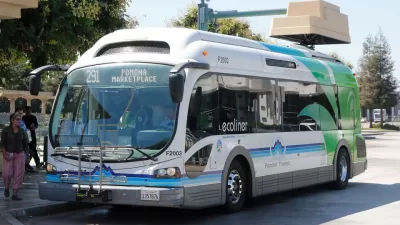When Volkswagen funded a $3 billion environmental mitigation trust as the result of a settlement in the cheating scandal three years ago, states could have used that money to fund things like electric buses.

"States are missing opportunities to jumpstart transportation electrification using money from the Volkswagen emissions cheating settlement, according to a report released recently by two national advocacy groups," reports Frank Jossi.
The U.S. Public Interest Research Group Education Fund and the Environment America Research & Policy Center prepared the report, assigning letter grades to depending on "how they are allocating money from the settlement. Most states earned D or F grades for allowing money to be spent on diesel and other fossil fuel vehicles," explains Jossi.
Jossi's coverage focuses on the Midwest, where no states earned good marks. "The region’s top-performing states on the scorecard — Minnesota, Michigan and Ohio — received C grades. Illinois, Indiana, Iowa, Kansas, Missouri and Nebraska earned D’s while North and South Dakota and Wisconsin were given failing marks."
In addition to the explanations of the Volkswagen settlement provided by Jossi, the U.S. PIRG posted the report online and provided the following explanation about the Environmental Mitigation Trust funds created by the settlement.
Under the terms of the settlement, states can spend their share of the Environmental Mitigation Trust funds in several different ways, including by purchasing newer diesel vehicles, natural gas vehicles, and electric vehicles, as well as repowering older diesel vehicles with newer engines or electric motors. States are also allowed to use up to 15 percent of their award on electric vehicle (EV) charging infrastructure. How each state spends its share of the funds within these allowable uses is up the state but must be set forth in a “Beneficiary Mitigation Plan” submitted to a trustee.
The report would have granted states higher grades if they'd focused this spending on electric vehicles. Instead, 37 states received a D or an F.
FULL STORY: Report: States missing opportunities to electrify transportation with VW money

Planetizen Federal Action Tracker
A weekly monitor of how Trump’s orders and actions are impacting planners and planning in America.

San Francisco's School District Spent $105M To Build Affordable Housing for Teachers — And That's Just the Beginning
SFUSD joins a growing list of school districts using their land holdings to address housing affordability challenges faced by their own employees.

The Tiny, Adorable $7,000 Car Turning Japan Onto EVs
The single seat Mibot charges from a regular plug as quickly as an iPad, and is about half the price of an average EV.

Seattle's Plan for Adopting Driverless Cars
Equity, safety, accessibility and affordability are front of mind as the city prepares for robotaxis and other autonomous vehicles.

As Trump Phases Out FEMA, Is It Time to Flee the Floodplains?
With less federal funding available for disaster relief efforts, the need to relocate at-risk communities is more urgent than ever.

With Protected Lanes, 460% More People Commute by Bike
For those needing more ammo, more data proving what we already knew is here.
Urban Design for Planners 1: Software Tools
This six-course series explores essential urban design concepts using open source software and equips planners with the tools they need to participate fully in the urban design process.
Planning for Universal Design
Learn the tools for implementing Universal Design in planning regulations.
Smith Gee Studio
City of Charlotte
City of Camden Redevelopment Agency
City of Astoria
Transportation Research & Education Center (TREC) at Portland State University
US High Speed Rail Association
City of Camden Redevelopment Agency
Municipality of Princeton (NJ)





























